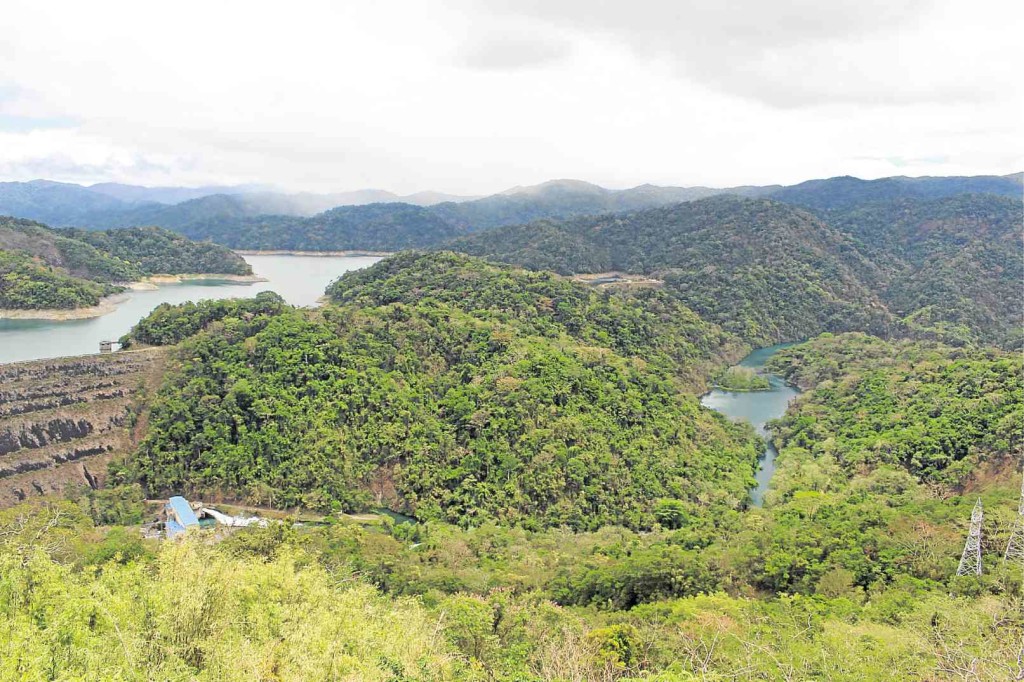NGCP, Napocor to reforest Angat, Mak-Ban
WATERSHED management may seem far removed from the pressing concerns of energy companies.
But those in the industry know full well that watersheds play a crucial role in the energy sector.
They support river systems and other bodies of water that are vital to the operations of hydroelectric plants.
They also support the habitats of plants and animals, and help prevent flooding such as what happens in areas near denuded forests.
The burning desire to keep watersheds healthy prompted the National Grid Corp. of the Philippines (NGCP) and the National Power Corp. (Napocor) to commit to work together and reforest parts of the Mak-Ban and Angat watershed reservation areas, which are traversed by critical transmission line projects.
NGCP said the reforestation projects were directed at areas traversed by two critical transmission line projects: the Lumban EHV-Bay 230-kilovolt line upgrading project and San Jose-Angat 115-kV transmission line upgrading project.
The partnership ensures that two of the country’s largest and most crucial watershed reservations are assured of continuous and sustainable protection.
The parties signed a memorandum of agreement last March 15, under which the two energy companies and their partner-peoples’ organizations committed to renew and enhance 50 hectares of the Mak-Ban watershed and five hectares of the Angat watershed reservations.
Together, they will plant a total of 88,750 tree seedlings.
According to Napocor’s watershed management department, there will be separate reforestation projects for Angat and Mak-Ban.
For Angat, there will be a three-year reforestation project in a five-hectare area in barangays San Mateo and San Lorenzo in Norzagaray, Bulacan.
A total of 5,400 seedlings will be planted, with the breakdown in species as follows: narra (Pterocarpus spp.) 500 seedlings; kamagong (Diospyros spp.) 500; dipterocarp species 1,000; palosanto (Bursera spp.) 620; cacao (Theobroma spp) 875; coffee (Coffea spp.) 730; jackfruit (Artocarpus spp.) 150; cashew (Anacardium spp) 200; rambutan (Nephelium spp.) 100; kakauate (Gliricidia spp.) 625; and bamboo (Bambusa spp.) 100 seedlings.
But Napocor noted that the choice of species and number were tentative subject to availability at the time of actual planting.
For Mak-Ban, there will be a three-year reforestation project in a 50-hectare area in Barangay Sta. Elena, Sto. Tomas, Batangas. Napocor said a total of 83,350 seedlings would be planted.
The choice of species are as follows: narra (Pterocarpus spp.) 12,000 seedlings; raintree (Samanea spp.) 26,800; duguan species (Myristica fragrans) 1,000; palong maria 1,000; kupang (Parkia timoriana) 10,550; alibangbang (Bauhinia spp) 5,000; dipterocarps 5,000; jackfruit (Artocarpus heterophyllus) 1,000; kamansi (Artocarpus spp.) 1,000; duhat (Syszygium spp) 2,000; and coffee (Coffea spp.) 18,000 seedlings.
Dipterocarp are mainly tropical lowland forest trees such as the apitong, bagtikan, red lauan, mayapis and malaanonang.
NGCP said the partners had also signed up local peoples’ organizations to assume stewardship of the sanctuaries. The reforestation will be done in coordination with Mt. Malaraya-Malepunyo Watershed Protection Council and Sagip Sierra Madre Environmental Society, Inc.
“NGCP’s partnership with NPC and the POs signifies our thrust to not only provide reliable and adequate power transmission service but, at the same time, protect and enhance the environment in areas where we operate. The preservation of these critical areas is our priority as environmental stewards, not only in Norzagaray, Bulacan and Sto. Tomas, Batangas, but throughout the country,” NGCP said.
Napocor’s watershed management department protects and preserves 11 watershed systems under its care and conducts corporate social responsibility (CSR) projects aimed to improve the quality of life of the residents and communities living near or within the watershed.
In June 2001, Republic Act 9136, otherwise known as the “Electric Power Industry Reform Act of 2001,” was enacted to institute reforms in the industry.
The major aspects of the reforms include the restructuring of the entire power industry to introduce competition in the generation sector, change from government to private ownership, and introduction of a stable regulatory framework for the electricity sector.
The Epira organized the industry into four sectors: generation, transmission, distribution and supply. The structural reforms resulted, among others, in the creation of two government-owned and controlled corporations (GOCCs), the Power Sector Assets and Liabilities Management Corp. or PSALM to manage Napocor’s liabilities and assets privatization, and the National Transmission Corp. or Transco.
NPC was retained as a GOCC to perform the missionary electrification functions, such as providing power generation and its associated power delivery systems in areas that are not connected to the transmission system, through its Small Power Utilities Group (SPUG); to operate and maintain the generation assets transferred to PSALM pending their disposal; and to manage the watersheds.
Grid operator NGCP, meanwhile, is a privately owned corporation in charge of operating, maintaining, and developing the country’s power grid. It transmits high-voltage electricity through energy transmission “superhighways” that include the interconnected system of transmission lines, towers, substations and related assets.
The consortium, which holds the 25-year concession contract to operate the country’s power transmission network, is comprised of Monte Oro Grid Resources Corp. led by Henry Sy, Jr. Calaca High Power Corp. led by Robert Coyiuto Jr., and the State Grid Corp. of China or SGCC as technical partner.

